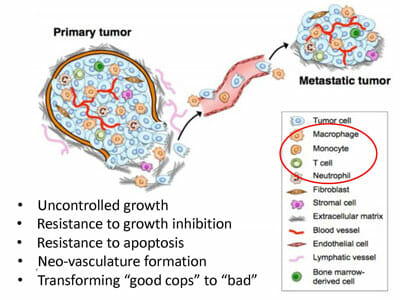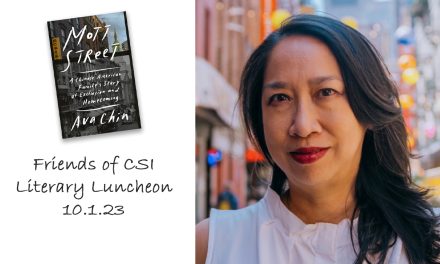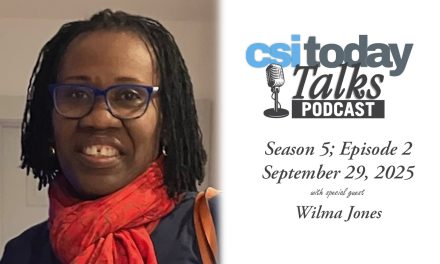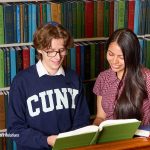For Girolama Gambino, it’s just a matter of time before researchers find a cure for cancer. And the biology senior is a part of that effort thanks to summer cancer research workshops implemented by a College of Staten Island professor that have radically expanded that opportunity.
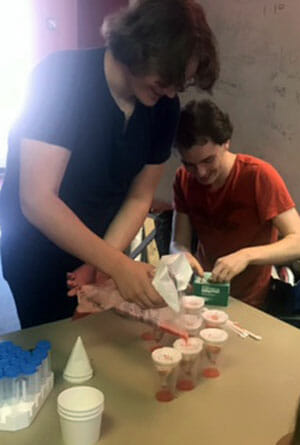
Students preparing samples of the DNA of strawberries for use in the summer cancer workshop implemented by Prof. Nancy Liu-Sullivan.
“With the technology we have available now and the data we have available, I definitely think it’s a possibility,” Gambino said. “It’s just a question of time.”
Vincent Peetz, who also participated in the workshops, said the work induced a sense of awe.
“The more you study (cancer), the more amazed you get at just how complex it is,” Peetz said. “The workshops allowed us to appreciate how formidable an opponent cancer is.”
Gambino’s optimism comes largely from her participation in the workshops organized and conducted by Dr. Nancy Liu Sullivan. The workshops are a pilot and their success has given Dr. Liu-Sullivan hope that grant support will be obtained to solidify and expand them.
“From the very beginning when I joined the CSI biology faculty in Fall 2014 from Memorial Sloan Kettering Cancer Center, I wanted to promote a research-based experience for students,” Dr. Liu-Sullivan said. “But while my 400-level Immunology course could take 16 students, my research lab course can only accommodate four students.
“We launched the summer workshops to expand the learning opportunity,” she explained.
The workshops immerse students in the complex and fascinating world of cancer research. Twice a week in June and July, CSI undergraduates joined with high school students from the vicinity of CSI on the CSI campus for lab work and discourse led by Dr. Liu-Sullivan. To broaden the learning repertoire, Dr. Abdeslem El Idrissi, Dr. Chang-Hui Shen, and Dr. Richard Veit mentored the students in their respective areas of expertise, in the format of lectures and study materials.
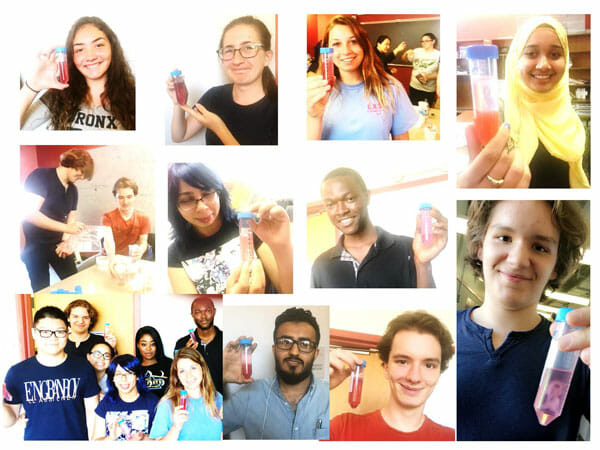
A collage of photos of students who participated in the Summer Cancer Workshop organized under the direction of Prof. Nancy Liu-Sullivan.
“Expanding access to faculty expertise is critical to helping students succeed,” said Dr. Vivian Incera, Dean of Science and Technology. “It’s so exciting to see the workshops bring together bright minds with great potential, and ultimately doing so is inspiring.”
In the first year workshop, students looked at using antibiotics to treat tumors; in the second summer workshop, they scanned an international database of gene studies looking for patterns of genes that are over-expressed in cancer diagnoses. One of the genes on which the 2018 workshop focused was PD-1, which is particularly noteworthy because the discovery of PD-1 immunotherapy was awarded the 2018 Nobel Prize in Physiology and Medicine in October.
“It’s expanded my interest in to cancer biology and bioinformatics, fields I did not know much about until I was exposed to them,” said Vincent Peetz, now a first-year biochemistry student at SUNY Stonybrook. “It also introduced me to a variety of new tools that I can use in my research.”
“In the first year, we were hands-on, using a cell-based model to test an experimental drug,” Liu-Sullivan said. “We moved toward computational biology in the second year, utilizing a publicly accessible database that includes cancer gene data from all over the world. I guided students through a meta-analysis of differentially expressed genes, in a small panel of cancer types.”
The results of the research in the workshops is useful far beyond the classroom, Dr. Liu-Sullivan added. Findings from the workshop bear potential translational potential in the clinic.
Ultimately, said Gambino, who is contributing a piece to a comprehensive review article Dr. Liu-Sullivan has been invited to write for a science journal, that direct experience made the workshops particularly interesting.
Dr. Liu-Sullivan “extends a lot of opportunities,” Gambino said.
The workshops are not confined to campus: Visits to other laboratories introduce students to other researchers and their programs.
“Dr. Liu-Sullivan’s workshops reflect our commitment to providing students with direct, real-world research experience,” said Chang-Hui Shen, Chair of the Biology Department. “This kind of experience is essential to helping students truly learn about as complex and complicated topic as cancer.”
Gambino and Peetz echoed Dr. Shen’s view.
“The workshops give you exposure to different layers” of cancer research,” Gambino said. “You have to be able to do data analysis, [in addition to] practical lab work.”
“The workshops introduced me to a bunch of different lab techniques and familiarized me with programs used for data analysis,” Peetz said. “These tools make life easier and allow you to obtain more insightful conclusions from data.”
Given the high interest so far in the workshops, Dr. Liu-Sullivan said the outlook is good for expansion.
“We’ll strategize on how to improve and expand the pilot study,” she said, “to solidify the foundation for grant support with a leading research university in New York City on board for collaboration.”

